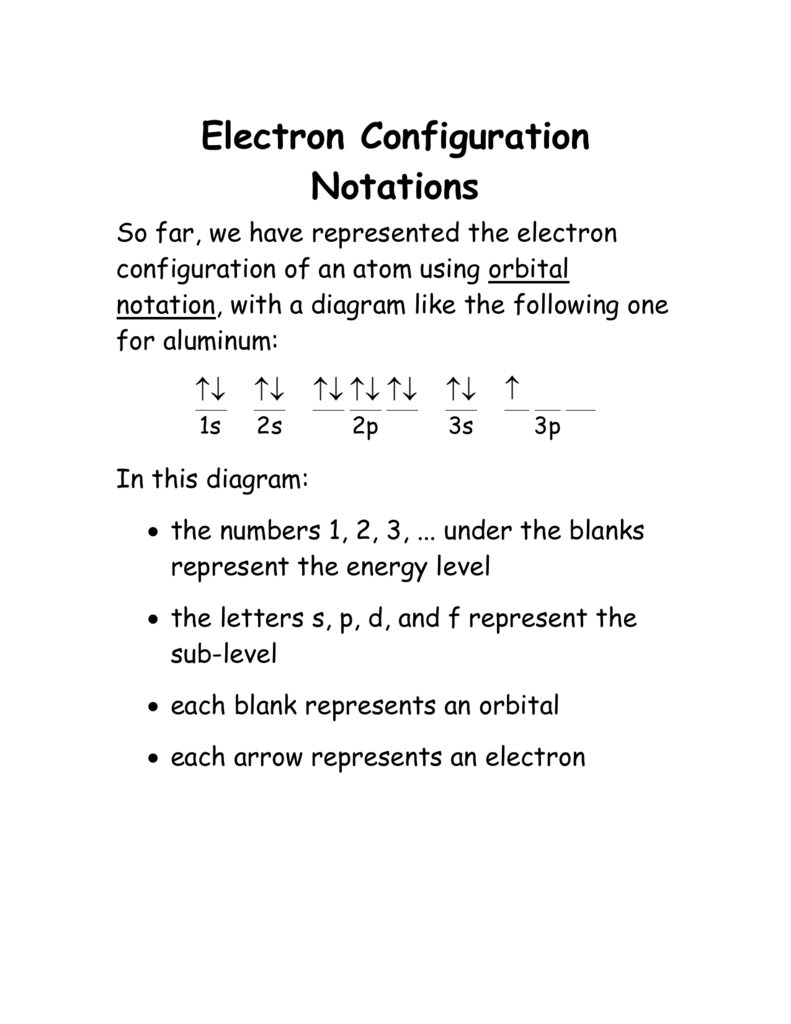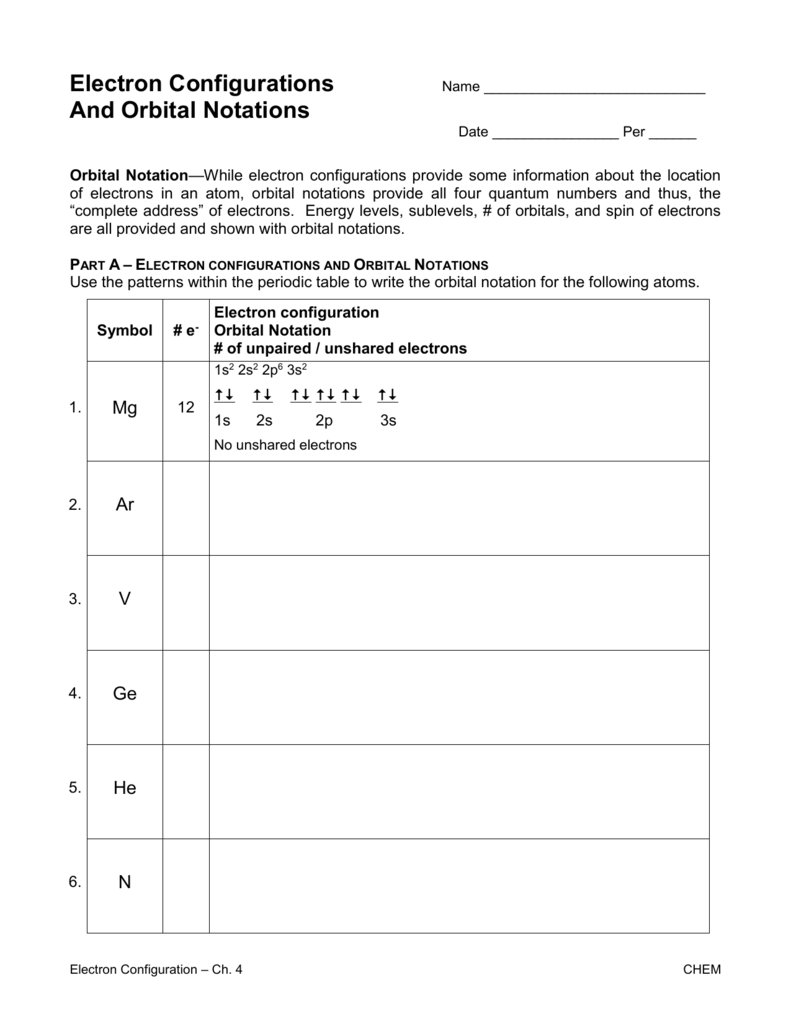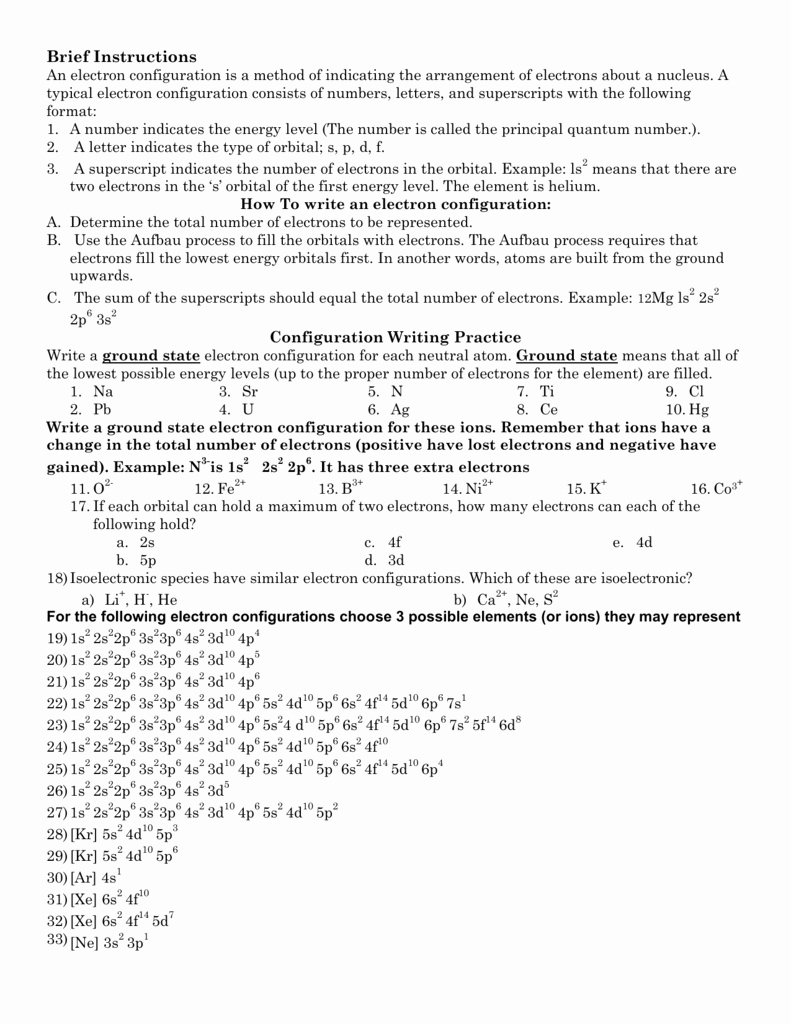Electron Configuration Orbital Notation Worksheet Answers - We will learn how to use the periodic table to remember the orbital structure, and then write it using the shorthand notation of electron. For each of the following electron configurations, tell whether they are in an excited or ground state: Write the ground state electron configuration of the following neutral elements in orbital notation, orbital notation with arrows and in short hand. Draw the orbital diagrams for the following ions. This will be the same orbital diagrams as a neutral atom except you've added or subtracted some. Learn to arrange electrons in atoms, understanding orbital notation, aufbau principle, and hund's rule. An electron is an excited state.
Learn to arrange electrons in atoms, understanding orbital notation, aufbau principle, and hund's rule. An electron is an excited state. This will be the same orbital diagrams as a neutral atom except you've added or subtracted some. Write the ground state electron configuration of the following neutral elements in orbital notation, orbital notation with arrows and in short hand. For each of the following electron configurations, tell whether they are in an excited or ground state: Draw the orbital diagrams for the following ions. We will learn how to use the periodic table to remember the orbital structure, and then write it using the shorthand notation of electron.
We will learn how to use the periodic table to remember the orbital structure, and then write it using the shorthand notation of electron. Draw the orbital diagrams for the following ions. Learn to arrange electrons in atoms, understanding orbital notation, aufbau principle, and hund's rule. For each of the following electron configurations, tell whether they are in an excited or ground state: Write the ground state electron configuration of the following neutral elements in orbital notation, orbital notation with arrows and in short hand. An electron is an excited state. This will be the same orbital diagrams as a neutral atom except you've added or subtracted some.
Orbital Diagrams And Electron Configuration Worksheet
An electron is an excited state. Learn to arrange electrons in atoms, understanding orbital notation, aufbau principle, and hund's rule. We will learn how to use the periodic table to remember the orbital structure, and then write it using the shorthand notation of electron. For each of the following electron configurations, tell whether they are in an excited or ground.
Electron Configuration And Orbital Notation Worksheet Answers Kid
An electron is an excited state. This will be the same orbital diagrams as a neutral atom except you've added or subtracted some. Learn to arrange electrons in atoms, understanding orbital notation, aufbau principle, and hund's rule. For each of the following electron configurations, tell whether they are in an excited or ground state: We will learn how to use.
Electron Configuration Worksheet
Learn to arrange electrons in atoms, understanding orbital notation, aufbau principle, and hund's rule. Draw the orbital diagrams for the following ions. We will learn how to use the periodic table to remember the orbital structure, and then write it using the shorthand notation of electron. For each of the following electron configurations, tell whether they are in an excited.
Electron Configuration And Orbital Notation Worksheets 2 Ans
An electron is an excited state. This will be the same orbital diagrams as a neutral atom except you've added or subtracted some. Draw the orbital diagrams for the following ions. We will learn how to use the periodic table to remember the orbital structure, and then write it using the shorthand notation of electron. Learn to arrange electrons in.
Free Printable Electron Configuration Worksheets
For each of the following electron configurations, tell whether they are in an excited or ground state: Draw the orbital diagrams for the following ions. We will learn how to use the periodic table to remember the orbital structure, and then write it using the shorthand notation of electron. This will be the same orbital diagrams as a neutral atom.
How to Solve Electron Configuration and Orbital Notation Worksheet 2
Learn to arrange electrons in atoms, understanding orbital notation, aufbau principle, and hund's rule. This will be the same orbital diagrams as a neutral atom except you've added or subtracted some. An electron is an excited state. Draw the orbital diagrams for the following ions. We will learn how to use the periodic table to remember the orbital structure, and.
Electron Configuration Orbital Notation Worksheet Answers Printable
An electron is an excited state. Learn to arrange electrons in atoms, understanding orbital notation, aufbau principle, and hund's rule. Write the ground state electron configuration of the following neutral elements in orbital notation, orbital notation with arrows and in short hand. We will learn how to use the periodic table to remember the orbital structure, and then write it.
Electron Configurations And Orbital Diagrams Worksheet Elect
Write the ground state electron configuration of the following neutral elements in orbital notation, orbital notation with arrows and in short hand. For each of the following electron configurations, tell whether they are in an excited or ground state: Draw the orbital diagrams for the following ions. This will be the same orbital diagrams as a neutral atom except you've.
Electron Configuration Worksheets With Answers (Extensive Guide to Solve)
We will learn how to use the periodic table to remember the orbital structure, and then write it using the shorthand notation of electron. This will be the same orbital diagrams as a neutral atom except you've added or subtracted some. For each of the following electron configurations, tell whether they are in an excited or ground state: An electron.
Electron Configuration Practice Worksheet With Answers
We will learn how to use the periodic table to remember the orbital structure, and then write it using the shorthand notation of electron. For each of the following electron configurations, tell whether they are in an excited or ground state: Learn to arrange electrons in atoms, understanding orbital notation, aufbau principle, and hund's rule. Draw the orbital diagrams for.
Learn To Arrange Electrons In Atoms, Understanding Orbital Notation, Aufbau Principle, And Hund's Rule.
We will learn how to use the periodic table to remember the orbital structure, and then write it using the shorthand notation of electron. For each of the following electron configurations, tell whether they are in an excited or ground state: An electron is an excited state. Draw the orbital diagrams for the following ions.
Write The Ground State Electron Configuration Of The Following Neutral Elements In Orbital Notation, Orbital Notation With Arrows And In Short Hand.
This will be the same orbital diagrams as a neutral atom except you've added or subtracted some.









